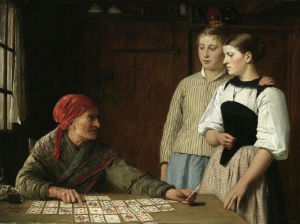Tagged: the Seventies
Predictions and Generational Precis
What can one say about a collection of stories meant to lead a reader into a decade, not reflect upon one that’s passed? I just finished the naked i: fictions for the seventies, published in 1971, and I’m not sure what to think, in terms of how well the book actually represented the general zeitgeist of the Western literary world during that era. After all, I didn’t even arrive on this planet until midway through said decade, not to mention being able to offer any authoritative judgment on it, even in terms of having paid attention to the seventies as a defining factor in whatever I may be reading.

Fortune Teller, Samuel Albrecht Anker, via Wikimedia Commons.
Maybe what’s more perversely interesting to me is whether the editors of this collection felt that the authors they’d selected (mostly writers of fiction) would be remembered, and strikingly so, way down the line in the 21st century– and whether they thought the approaches and styles said writers were adopting would transform the literature of the future. As to the first question, maybe half of those featured in the “our contemporaries” section are well-known today; admittedly, most probably are, for voracious readers of stuff that tends to find its way into New Yorker-ish outlets.
As to the second query, maybe it’s just because I’m getting older in general that some of these pieces do feel dated in a particular way, almost as if they were the stuff of adolescent assurance in literary form, a bundle of attitudes and assertions that society had over and done with long ago (and hence, do make up the identifiable stuff of a particular time period, in which case, the editors really may have put their finger on something). The piece by Norman O. Brown, wrestling with Freud’s legacy and (in language he wouldn’t have used) the need to do away with boundaries, man, like, between thought and the world; Ken Kesey’s neo-Beat letter to a friend; the in-your-face fuckfest in an excerpt from a Leonard Cohen novel*– yeah, those selections do feel clad in bell bottoms– but in terms of lasting influence, I get a sense that they merely represent something we had to get out of our collective system, and then move on.
Not all of the book was devoted to predicting what would define an era; the best part of it, in fact, was the section containing said era’s literary predecessors. The first hundred-plus pages constituted an unbelievable treasure trove: Kafka, Borges, Cortázar, Ellison, Nabokov, Wright, and a couple of others. My mind was blown with the sheer high-quality concentration of it all. And then… the rest. Ted Hughes’s “Snow” and Jan Gerhard Toonder’s “The Spider” were probably my favorite of what remained, but damn– start off a book with the big hitters and then expect newcomers to live up to that? Not quite fair to young authors trying to make a name for themselves.
Well. No answers, as usual. But I’m truly glad I didn’t toss this one into the Goodwill pile, as almost happened when I was in the process of moving. It’s got me thinking, though, even if I’m not the best person to ask: what might we include in a volume attempting to give a literary summation of the 21st century’s first decade, at least for a certain part of the world– and is anyone willing to make a bolder move, and put together a predictive list of what will be representative of its second ten years?
* Beautiful Losers. Having read that book years ago, I’m not sure whether to be reassured or not about the continuity of my own taste, feeling just as eye-rollingly disgusted now as I did then at his narrative shenanigans.